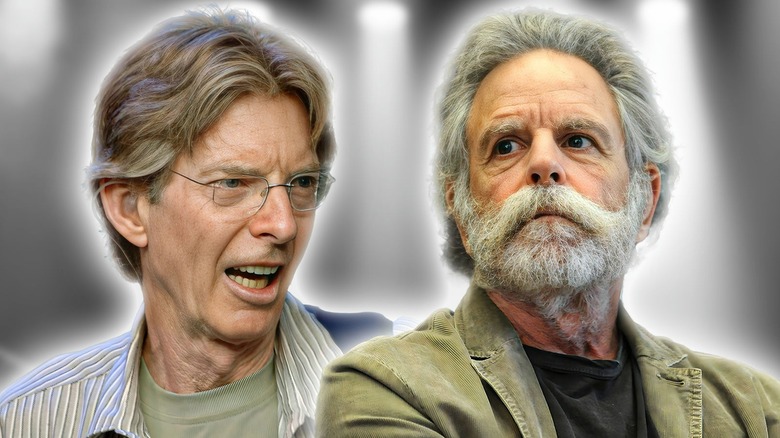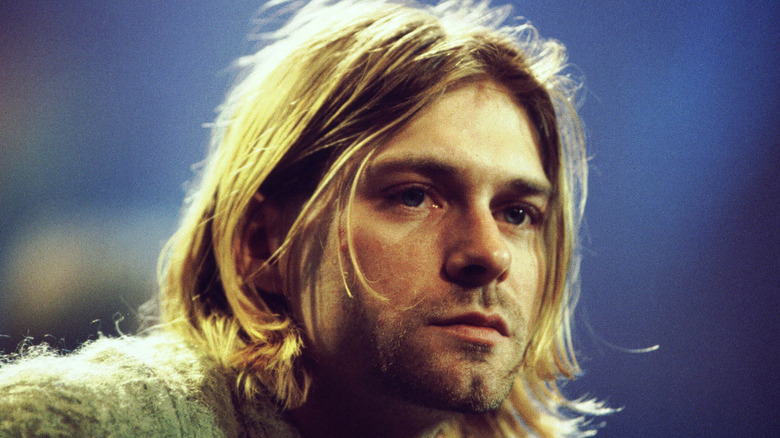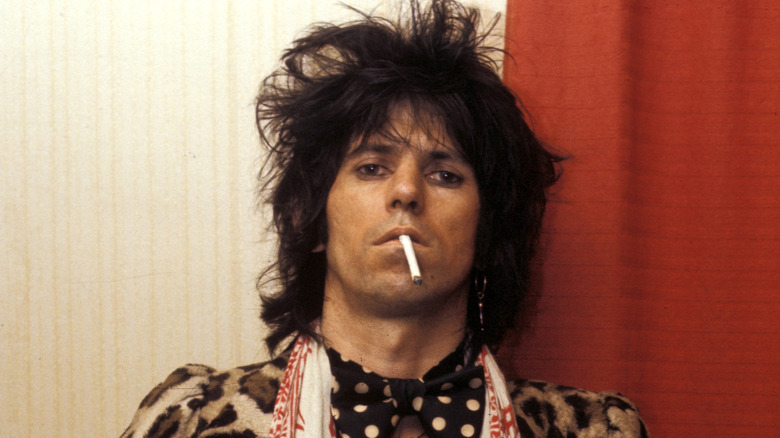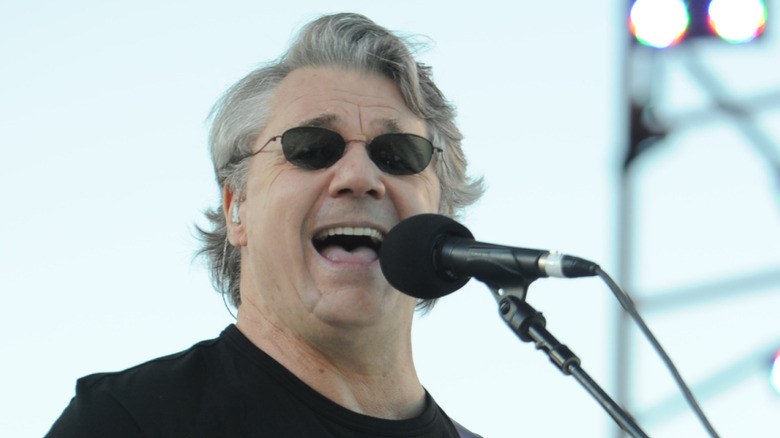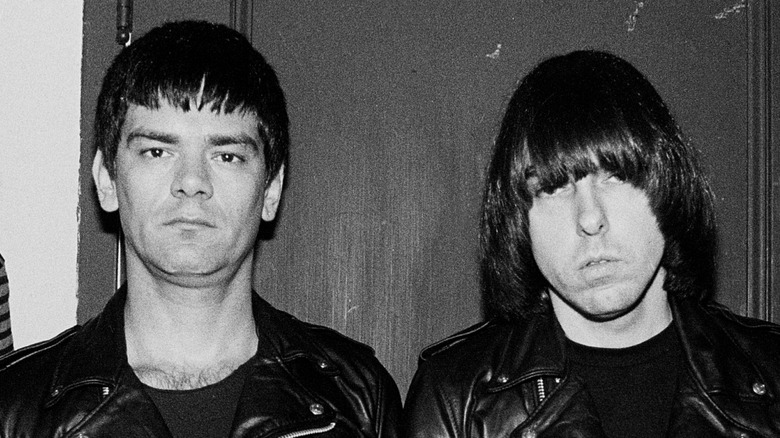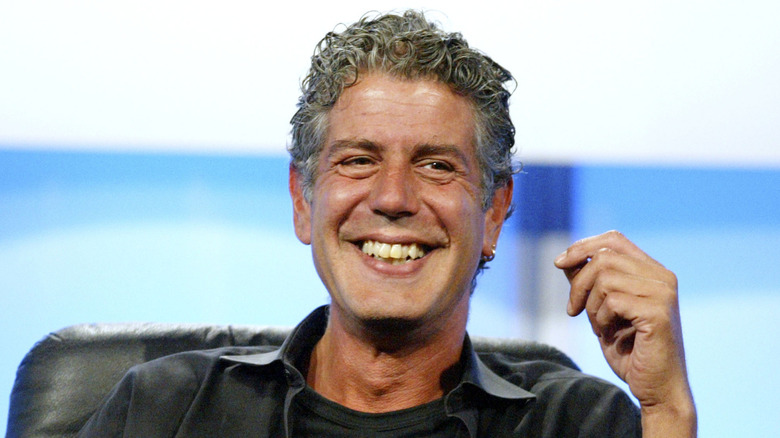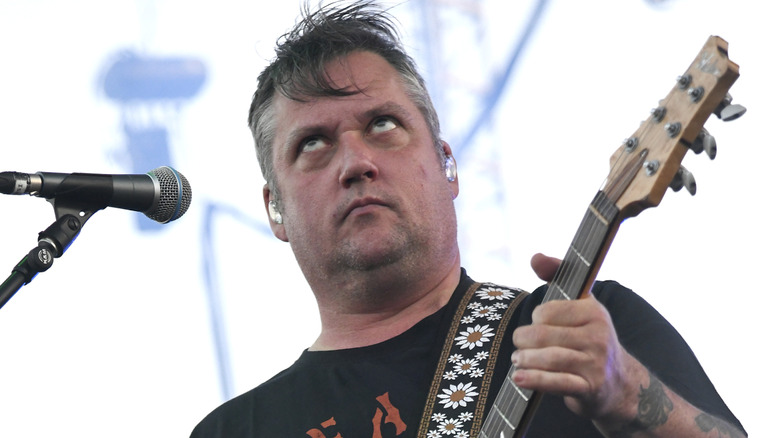Stars Who Couldn't Stand The Grateful Dead
The Grateful Dead occupies a unique place in the annals of American music history. The group that inspired generations of guitar-noodling jam bands rarely sold more than half a million copies of any of its albums and scored just one hit single — in the 1980s, decades after its 1960s counterculture-defining heyday. But even though the Grateful Dead did not achieve mainstream success, it is one of the most unequivocally famous and recognizable acts of all time. Its legions of tie-dye wearing fans dutifully followed along on the Dead's never-ending concert tours, and even non-fans recognize the band's enduring imagery of skeletons and dancing bears. The names of some of the constituent musicians, like Jerry Garcia, Bob Weir, and Phil Lesh, are widely known, and the band was Inducted into the historically controversial Rock and Roll Hall of Fame in 1994.
But as special as the Grateful Dead may be to its fans and to music culture in general, that metaphorical pedestal brings with it the opportunity to criticize. The group's original era, fanbase, and musical style are all polarizing, and throughout its long history and after, many prominent public figures, including fellow musicians, let it be known that they didn't care much for the band or what it represented. Here are some of the famous people who didn't enjoy the Grateful Dead.
Kurt Cobain
When Nirvana released "Nevermind," it became one of the most important rock bands of the 1990s and popularized the sound of Seattle. A vehicle for the songs of lead singer and chief songwriter Kurt Cobain, Nirvana was at the forefront of the Pacific Northwest grunge scene, a deft combination of catchy pop elements, sludgy and down-tuned guitar riffs, and the spirit of punk rock. Cobain embraced many parts of a punk identity, including an animosity toward older, seemingly failed cultural revolutions. "I like to blame my parents' generation for coming so close to social change then giving up," Cobain opined about '60s hippies in a journal entry (via The Marginalian). For a Nirvana photoshoot in the early 1990s, Cobain wore a T-shirt that emphasized his attitudes: It read "Punk's not dead" and "Kill the Grateful Dead."
Cobain so resented the Grateful Dead that he crudely objected to the band's iconography being connected with his own band. "I hate tie-dyed T-shirts, too. You know there are bootleg tie-dyed T-shirts of Nirvana? I hate that," he told Melody Maker in 1992 (via Live Nirvana) "I wouldn't wear a tie-dyed T-shirt unless it was dyed with the urine of Phil Collins and the blood of Jerry Garcia."
Keith Richards
The Rolling Stones' Keith Richards and the Grateful Dead's Jerry Garcia rank among the most acclaimed rock guitarists of all time, and they're also two of the most successful and influential musicians of any kind to emerge in the 1960s. Both have a signature sound and a demonstrated prowess with the guitar, Richards as a purveyor of electric blues-influenced rock and Garcia of a free-wheeling, semi-improvised, complex style.
One big difference is the guitarists' opinions about each other. The Grateful Dead guitarist harbored a major affinity for the Stones' 1967 album "Between the Buttons," and he covered some of its songs during several live shows. Richards didn't return the sentiment, voicing his distaste for the band, its long concerts, and its frontman's playing. "The Grateful Dead is where everybody got it wrong," Richards told Billboard in 2015. "Just poodling about for hours and hours. Jerry Garcia, boring s***, man. Sorry, Jerry."
Steve Miller
San Francisco in the late 1960s was the unofficial headquarters of the hippie countercultural movement, and so it naturally generated a lot of musicians. Many went on to become superstars with long careers, such as the Grateful Dead and Steve Miller, head of an eponymous band that would record many classic rock radio staples in the years to come, including "The Joker," "Jet Airliner," and "Take the Money and Run."
Just because they came up together in the same place at the same time, that didn't mean Miller enjoyed his cohort's music. "I couldn't stand that band," Miller said during a panel talk at the 2008 "I Create Music" exposition (via Reuters). He dismissed the San Francisco of the '60s as a "social phenomenon" rather than a musician incubator and believed his band was more technically proficient than all the others active at the time, such as the Grateful Dead.
Dee Dee Ramone and Johnny Ramone
In the 1970s, the Ramones helped define punk rock with its stripped-down, confrontational style. A four-piece unit who all dressed the same and adopted the stage surname "Ramone," the band played with unabashed amateurism, speed, and volume as it chugged its way through songs about dissatisfaction and antisocial attitudes. Compare that to the music of the Grateful Dead, with its long, meandering, epic songs about love and psychedelics played by a stage full of hippie virtuosos.
When asked their opinions about major rock bands by reporter Jim Sullivan in a 1979 interview published by Hard Noise in 2019, guitarist Joey Ramone and bassist Dee Dee Ramone offered their pointed, withering criticism of the Grateful Dead. "I guess we feel sorry for them," Dee Dee said, with Johnny adding, "I think they did too much LSD." Dee Dee went on to explain that he just couldn't be a fan. "I never had any interest. I saw some pictures of them when I was a kid and they looked so awful," he said. "I like nice clean-looking rock stars."
Anthony Bourdain
Often presenting himself in his first-person writing and on his many television travelogues as an edgy, angry chef, Anthony Bourdain made his musical preferences known. Bourdain absorbed a lot of the attitude and ethos of the 1970s punk rock movement that he experienced firsthand as a young man in New York, and he deeply enjoyed the music of bands such as the Modern Lovers, the Stooges, Patti Smith, Talking Heads, and Bad Brains. He just as passionately hated the music of Billy Joel and the Grateful Dead.
While he was friendly with Joel but would fire someone listening to one of the musician's songs in his kitchens, Bourdain harbored complete animosity for the Grateful Dead and its fans. "You know what? I may be a lefty, but I hate hippies. ... As a former employer, I learned very early to never hire a Dead fan because arrival time was always a problem with those guys," Bourdain said during a Q&A session at a 2010 speaking engagement. "I hate four-hour guitar solos."
Isaac Brock of Modest Mouse
One of the founding members of Modest Mouse, Isaac Brock started playing guitar and contributing agitated, yelping vocals for the band in 1992. It formed in and operated out of Issaquah, Washington, a suburb of Seattle, before decamping to Oregon. Like the Grateful Dead, Modest Mouse enjoys a sizable fan base but limited commercial success — the group's first and biggest single, "Float On," stormed the charts 12 years after the band's inception. Modest Mouse and the Grateful Dead are both guitar-driven bands that toured extensively, but that doesn't mean Brock had to like the Dead, or the subculture that formed around it.
In 2007, Rolling Stone reporter Austin Scaggs questioned Brock about his evidently well-known animosity toward the Grateful Dead. "Not them — their fans," Brock clarified. "It's living in Oregon and just seeing these worthless, talk-too-much-about-what-people-are-doing-wrong, not-really-doing-anything-themselves f***in' hippies. That I despise." While reluctantly admitting that the Grateful Dead's song "Casey Jones" had some merits, Brock went on to slam the band's followers some more. "I remember the last time the Grateful Dead played in Seattle, at the Seattle Center. I was living there, and after the show I was walking to work near there and I'd never seen so much debris. There were mountains of garbage," he recalled. "I thought they'd be environmentally conscious, but it was the filthiest I'd ever seen Seattle."
